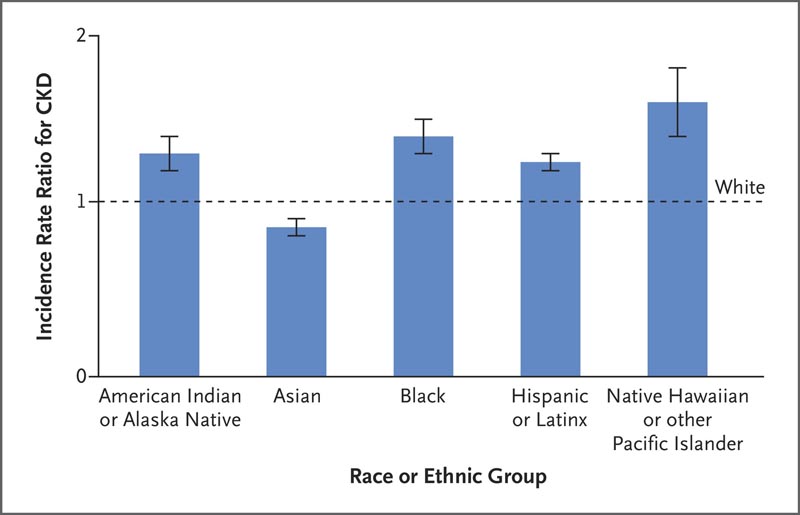A Providence article published in the New England Journal of Medicine highlights a study revealing a worryingly high incidence or rate of new onset of chronic kidney disease (CKD) in people with diabetes that was most evident in racial and ethnic minority groups.
The prevalence of kidney failure warranting dialysis or transplant more than doubled between 2000 and 2019 to nearly 800,000 people in the United States, with diabetes being the leading cause in 47% of those affected. The incidence of chronic kidney disease (CKD) among patients with diabetes is unknown, however, such data are vital to identify high-risk populations, determine the effectiveness of interventions, and evaluate effects on healthcare delivery and responses. of public health.

Figure 1. CKD incidence rate ratios among patients with diabetes. Chronic kidney disease (CKD) incidence rate ratios among patients with diabetes, stratified by race and ethnicity, are shown between 2015 and 2020. The dashed line represents the incidence rate ratio among white patients (reference group). . The analysis was adjusted for age and sex. �� bars indicate 95% confidence intervals.
The mean (±SD) age of adults with diabetes in our study population was 61±15 years and 55.2% were women .
Despite a recent decline, the persistently high incidence of CKD in the United States is concerning, given the large increase in the prevalence of diabetes and the accompanying high rates of kidney failure. Additionally, among patients with early-stage kidney disease, less than 10% know they have CKD at this point in the disease course, when therapies that prevent progression are most effective. Inclusive prevention, screening, and intervention strategies are needed to reduce the risk of CKD among people with diabetes.
Our study shows that, despite a recent decline, a high incidence of CKD persists in the United States. The incidence was lower among white adults with diabetes than among most other adults with diabetes.
Comments
The prevalence of kidney failure requiring dialysis or transplant more than doubled to nearly 800,000 people in the United States between 2000 and 2019 with diabetes as the leading cause. The rate of new-onset CKD in people with diabetes was previously unknown, but the value of such incidence data is vital for identifying high-risk populations, determining the effectiveness of interventions, and evaluating effects on health care delivery and outcomes. public health responses. Even more surprising, fewer than 10% of patients with early-stage kidney disease know they have CKD at a time when therapies to slow progression are most effective.
Researchers from Providence, the University of California, Los Angeles, the Centers for Disease Control and Prevention, and the University of Washington School of Medicine followed 654,549 adults with diabetes between 2015 and 2020 using electronic health records from Providence and the University of California, Los Angeles Health Department, large nonprofit health systems serving the western United States.
It found that rates of new-onset CKD were approximately 60%, 40%, 33%, and 25% higher in the Native Hawaiian/Pacific Islander, Black, American Indian/Alaska Native, and Hispanic/Latino groups. (a), respectively, compared to white people with diabetes. Although the high incidence of CKD in diabetes persists, the rate decreased from 8% to 6.4% per year in the general population with diabetes between 2015-2016 and 2019-2020.
"Given the rapid growth of the diabetes population in the United States and the corresponding high rates of kidney failure, the persistently high incidence of CKD marked by racial and ethnic disparities is concerning," said Katherine R. Tuttle, MD, lead author of the study. Executive Director of Research, Providence Inland Northwest Health and Professor of Medicine, University of Washington. “Inclusive prevention, screening and intervention strategies are needed to reduce the risk of CKD in people with diabetes.”
















